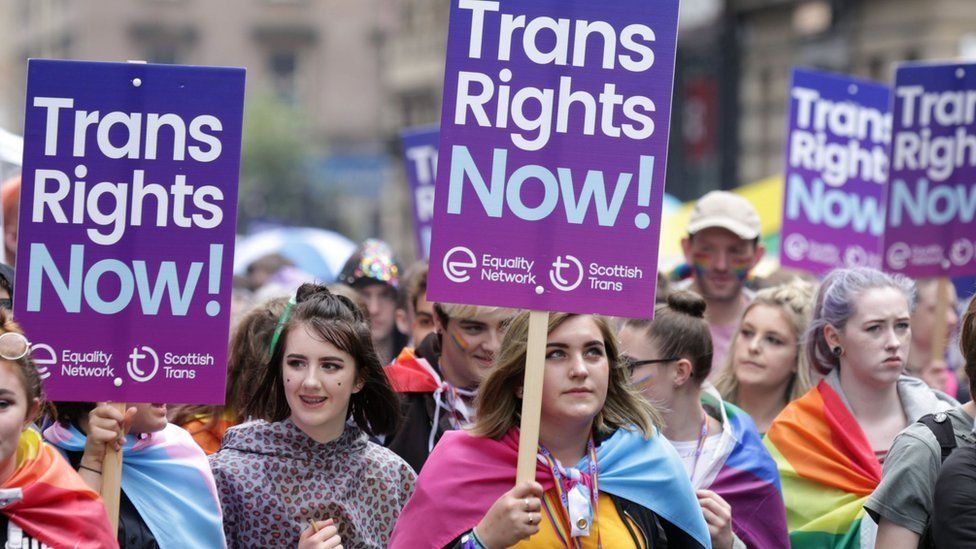ARTICLE AD BOX
 Image source, PA Media
Image source, PA Media
The Scottish government has published its legal arguments in its bid to overturn a UK government block on gender reform legislation.
In its 22-page petition to the Court of Session, it argues that concerns raised by Scottish Secretary Alister Jack are "irrational".
It said there was an absence of any supporting evidence for his claims.
Mr Jack used a Section 35 order to ensure the new law, passed by MSPs in December, could not be enacted.
He has said the law would have a detrimental impact on areas that are reserved to Westminster such as equalities protections for women and girls.
Mr Jack previously told the Commons the reforms would have an adverse impact on single sex clubs, associations and schools and protections such as equal pay.
He said having different processes across the UK would create "significant complications" and could lead to "more fraudulent or bad faith applications".
The Scottish government has challenged the Section 35 order on four counts: that Mr Jack made a "material error of law", that his concerns about the safeguards in the Bill were "irrelevant" to the order's making and that his reasons were "inadequate", which would make the order "unlawful".
Image source, Getty Images
Image caption,The bill sparked protests from women's groups
The reforms in the Gender Recognition Bill are intended to make it easier for trans people to change their legally-recognised sex.
The bill would lower the age that people can apply for a gender recognition certificate (GRC) - a legal document confirming a gender change - from 18 to 16.
It would also remove the need for a medical diagnosis of gender dysphoria, with applicants only needing to have lived as their acquired gender for three months rather than two years - or six months if they are aged 16 or 17.
Trans campaigners welcomed the bill, however critics of the plans are worried that allowing anyone to "self-identify" as a woman could impact on women's rights and access to single-sex spaces like refuges and changing rooms.
Passed by a majority
The bill was passed by 86 votes to 39 in the Scottish Parliament but it has caused deep divisions within the SNP, with Ash Regan - a candidate in the recent party leadership contest - quitting as a minister in the run-up to the vote.
Kate Forbes, who also stood for the leadership, was on maternity leave when the vote took place but later she said she would not have backed the bill in its current form.
Both Ms Regan and Ms Forbes have said they would not have wanted to challenge the block in the courts if they had won the leadership.
And there have been warnings from some within the party - including Ms Regan - that the government stands little chance of winning the case.
Former First Minister Nicola Sturgeon called the decision to block the bill a "full-frontal attack" on the Scottish Parliament, and vowed to oppose it before her resignation earlier this year.
New First Minister Humza Yousaf vowed to challenge the Section 35 order, saying it was an "undemocratic veto over legislation that was passed by a majority of the Scottish Parliament".
In its petition to the Court of Session, lawyers for the Scottish government said: "Having regard to the absence of any supporting evidence produced by the Secretary of State, and in the context of research, consultation and comparative information available to, and considered by, the Scottish Parliament during the Bill's passage, the Secretary of State's concerns about the operation of the Bill are irrational."
The lawyers also said the three criteria for making such an order had not been met.
These criteria are that that the Bill impacts on reserved matters, that Mr Jack has "reasonable grounds" to believe it would impact on the operation of reserved laws and that the Scottish Secretary must provide adequate reasons for the block.
The petition was released in the hours after Social Justice Secretary Shirley-Anne Somerville made a statement to MSPs, telling them the government had "no option" but to challenge the order and claiming it was a bid to protect democracy.
A spokeswoman for the UK government said it would "robustly defend" the decision to prevent the Scottish government's Gender Recognition Reform Bill from becoming law.
"The Scottish Secretary made the order under Section 35 of the Scotland Act 1998 after thorough and careful consideration of all the relevant advice and the policy implications," she said.
"He was very clear in the accompanying statement of reasons how the Bill would have an adverse effect on reserved matters, including on the operation of the law as it applies to Great Britain-wide equalities protections."

 1 year ago
21
1 year ago
21








 English (US) ·
English (US) ·